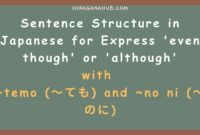Say Time and Clock in Japanese
Time is an essential part of everyday conversations. Learning how to ask and
tell time in Japanese is a fundamental skill that’s extremely useful,
whether for daily interactions or while traveling. This guide will walk you
through how to talk about time in Japanese language, complete with sentence
patterns, vocabulary, and examples for different scenarios.
Basic Sentence Patterns for Asking About Time
Here’s a simple guide to help you understand how to say time in Japanese and
use it naturally in conversation:
今何時ですか。 (Ima nan-ji desu ka?)
Meaning: “What time is it now?”
何時にですか。 (Nan-ji ni desu ka?)
Meaning: “At what time?” (Used to ask about the timing of an event or
activity.)
何時に行きますか。 (Nan-ji ni ikimasu ka?)
Meaning: “What time are we leaving?”
Some key vocabulary related to time:
- 時間 (Jikan): Time
- 秒 (Byō): Second
- 分 (Fun): Minute
- 時 (Ji): Hour
- 時計 (Tokei): Clock in Japanese
Numbers and Telling the Time
Understanding how to count in Japanese is crucial for discussing time. Below
are some basic numbers:
- 1: 一 (Ichi)
- 2: 二 (Ni)
- 3: 三 (San)
- 4: 四 (Yo or Shi)
- 5: 五 (Go)
- 6: 六 (Roku)
- 7: 七 (Nana or Shichi)
- 8: 八 (Hachi)
- 9: 九 (Kyū or Ku)
- 10: 十 (Jū)
When telling the time, add 時 (Ji) after the number for hours and 分 (Fun)
for minutes. Examples:
- 7:00 = 七時 (Shichi-ji)
- 7:30 = 七時半 (Shichi-ji han)
- 7:15 = 七時十五分 (Shichi-ji jū go-fun)
Another useful concept is 前 (Mae), which means “before” or “to” when
discussing time. It’s used to indicate how many minutes before the next
hour. For instance:
3:55 = 四時五分前 (Yoji go-fun mae)
Meaning: Five minutes to four.
4:56
= 五時四分前 (Goji yon-pun mae)
Meaning: Four minutes to five.



